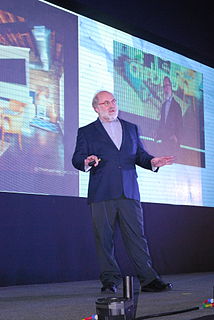A Quote by Aneel Bhusri
You don't see a lot of great companies built on easy problems to solve.
Related Quotes
One of the factors that make great companies so great is that they have processes that allow them to solve difficult problems again and again. These processes have developed over time as teams have successfully wrestled with a certain type of challenge. Eventually, people begin to say, "This is just how we do something around here." The problem develops when that team then has to solve a very different set of challenges. The processes that are such strengths can be crushing liabilities.
And I've come to the place where I believe that there's no way to solve these problems, these issues - there's nothing that we can do that will solve the problems that we have and keep the peace, unless we solve it through God, unless we solve it in being our highest self. And that's a pretty tall order.
Too many companies are reluctant to share technical information about threats with each other, and most open platforms and tools don't see widespread adoption. As a result, lots of us are reinventing the wheel and solving the same problems without realizing that our neighbors have already built great solutions.
We would solve a lot of huge problems that are causing massive suffering. Poverty, violence, homophobia, heterosexism, racism, the environment - all these things that are crippling us. We need big, bold, dangerous, crazy ideas to solve these problems. When failure is not an option, innovation and creativity are not options.
Solving problems is fine, but it has gotten to the point of being a global obsession. We somehow have it in our heads that if we solve all of the problems, we can sit back and enjoy the easy life. But in reality, we become lazy and complacent. And that's when we get flooded with even bigger problems.

































